#when i DO try to get down to create like with my ttrpg I've got literally nothing. and i got no new ideas for anything either
Explore tagged Tumblr posts
Note
Do you have any recommendations for games in the western genre? Or western fantasy/sci-fi? Absolutely can’t get enough of the combination of cowboys and six shooters, steampunk, and magic fantasy. I’m considering writing my own setting for DnD5E that combines these elements.
Theme: Fantastic Westerns
Friend, I think I've collected a real tight bunch of winners here, so I'm confident you'll find something that really scratches that itch you've got!
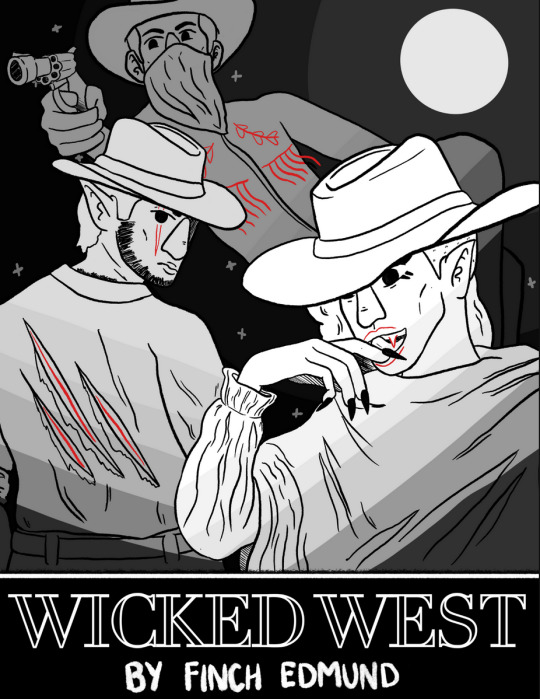
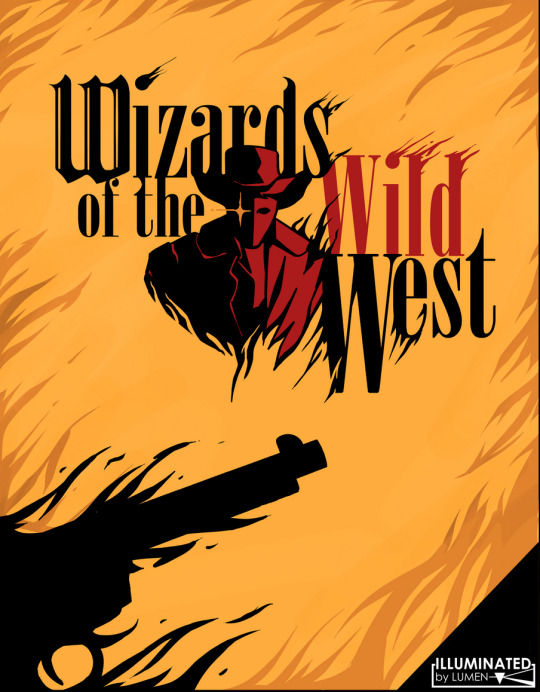
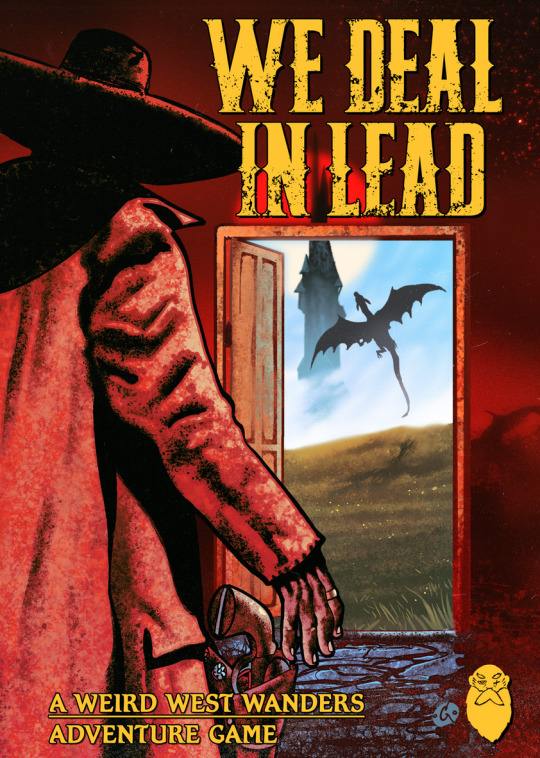

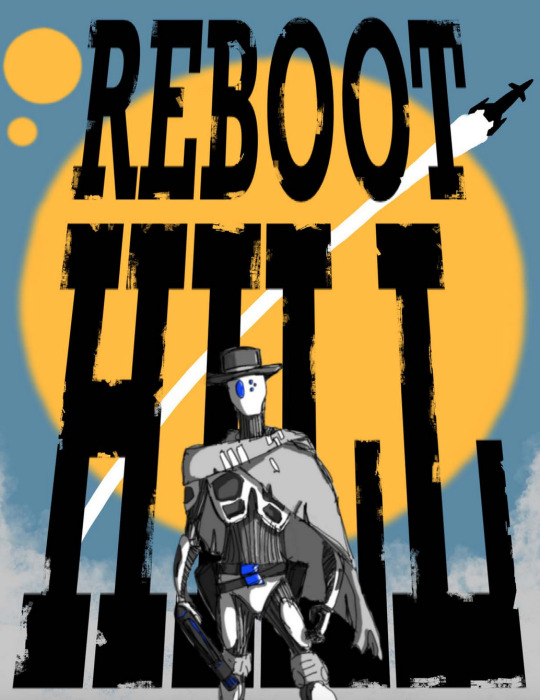
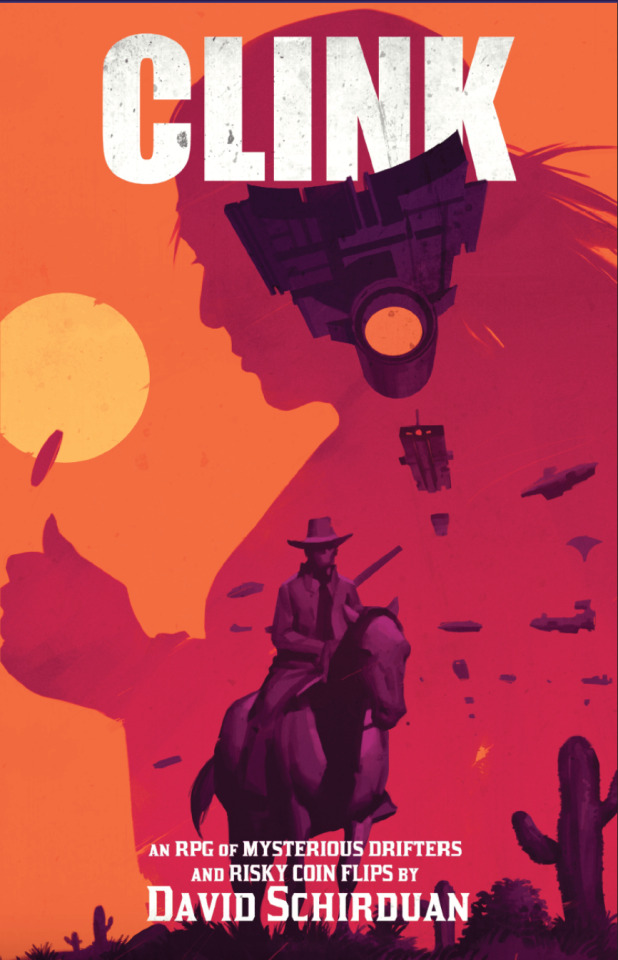
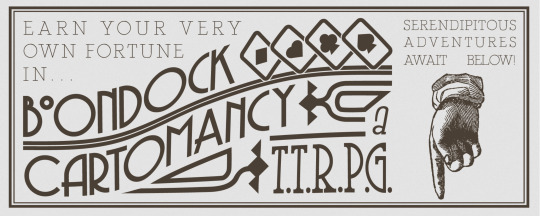
Wicked West, by Finch Edmund.
Wicked West is a PbtA game by Finch Edmund (they/them) about paranormal cowboys. It combines classic monsters with the backdrop of the old west and is meant to be played with at least two players with one player taking the role of Game Master. Wicked West is made to tell stories similar to the westerns of the 1940s-1960s about small towns and the struggles of life with a horror twist.
If you like combining monsters with your westerns, this is the game for you. It looks like you combine a couple of different options to make your character playbook, which is something I’m personally pretty jazzed about when it comes to creating characters. One interesting thing about Wicked West is the relationship your cowboy has with their horse: a vampire might feed off of their steed, while a witch can cast spells on their horse to run faster. If you don't mind a bit of a horror flavor to your Western, this might be the game for you.
Wizards of the Wild West, by ckellyrpg.
Wizards of the Wild West is an action-oriented TTRPG that combines fantasy magic with classic Wild West themes. It is powered by the LUMEN system, and takes heavy inspiration from looter-shooter games such as Destiny.
LUMEN is still a game that I’m excited to try out, so seeing it tagged onto a western game about wizards made me take a second look. This is a game for a raucous good time; you’ll be pulling off sweet character combos, with easy-to-understand breakdowns of each character class. Right now the game is still in development, but it’s still considered playable, so if you get it now it might have more content for you down the road!
We Deal in Lead, by Odin’s Beard.
You look to those closest to you, fellow gunslingers of the Order of the King. The arduous trek across the bleached desert is over and now you stand before a slip door. Though tested, the fellowship of your Order stands true.
You grasp the worn sandalwood grip of your artefact gun and twist open the door. You gasp as the sharp sea air hits your lungs. Gulls caw and the foam sprays your face like a baptism. You step through to another reality.
After all, there are other worlds than these.
We Deal In Lead comes highly recommended to me by folks who like the OSR scene. It’s based off of Cairn, a well-beloved fantasy system, and if you got the TTRPGs for Trans Rights in Florida bundle, you already have a copy!
The setting is meant to be somewhat post-apocalyptic, but the barriers between your world and others are thin, causing threats (and allies) from other dimension to have a chance to enter your world. The game focuses on combat, exploration and survival, and it’s almost completely compatible with anything released for Cairn.
If you like what you see so far with this game, you might also want to check out Omega City, a weird west city setting, still in ashcan form.
Vampire Cowboys, by Maddy Searle.
You are a gang of outlaws in the Wild West. You have a lot to contend with: enemy gangs, law enforcement, wild animals, and… did I mention? You’re also vampires. You must figure out how to survive in this harsh land, where “justice” is often swift and violent. Will you blend in with the crowd, and hide your vampiric side in an attempt to live as a gun-toting cowboy? Or will you give in to your monstrous urges and use your supernatural powers, making yourself known as a vampire? It’s entirely up to you.
This game premise is simple and easy to describe: you are vampires who are also cowboys. You live in a world where everything wants you dead, and you’re constantly fighting the parts of you that make you monstrous. The mechanics are very familiar if you’ve every come across a Lasers & Feelings game: a couple pages to read and you’re off to the races, ready to play.
Reboot Hill, by Groovy Dad Games.
REBOOT HILL is a sci-fi Western TTRPG set in the "Future West" of the far flung Hill-Ceballos System. When a war back on Earth results in a cyber-attack that frees all of the bots in the Hill-Ceballos, things go bad for the humans right quick. In the aftermath, bots have got to rely on their shooting irons and their processors to make their way in this new, post-human frontier.
REBOOT HILL is a card-driven tabletop role-playing game in which players portray "Aces"--bots with advanced AI that find themselves on the right or wrong side of the law.
Finally, a space western! Here’s a card-based game with a plethora of character options, including mechanical upgrades, as well as weapons and vehicles. You’re mainly going to be bounty hunters, chasing after varmints and villains so that you can scrape together a living. If you want a game whose game mechanics make you feel liked you’re sitting at a poker table, you should check out Reboot Hill.
Clink, by Technical Grimoire.
Clink is a tabletop RPG about drifters, the creeds that bring them together, and the history that drives them apart. This game uses coins to tell a story inspired by spaghetti westerns, ronin tales, and shows like Firefly or Supernatural.
Characters begin as rough sketches of the shifty sort you’d see in an old Western or Noir film. They all start as blank slates, their histories unknown. Tell stories about their past and create your character as you play.
I’m a big fan of Technical Grimoire, especially their expertly-designed Troika setting, Bones Deep. Clink isn’t Troika - it uses coins as a storytelling mechanic - but it’s very setting-flexible, as seen in the variety of the starting scenarios provided.
The game is also non-linear: throughout play your characters will experience flashbacks, which will help flesh out who they are as you play, and tell us something about who they used to be. You’ll start the game with two coins, which you can spend to gain a flashback, but you can also flip them to try and succeed at various tasks. As you play, you’ll also gain coins using a mechanic called a Trigger - bad habits that get them into trouble.
If you want a fresh set of rules to play around with in a flexible setting that stays true to the woes of outlaws and other Western tropes, I heavily recommend Clink.
Boondock Cartomancy, by Hookline & Sinker.
The consequences of westward expansion rear their head. Desolate, inhospitable, and unpredictable - the Outbacks are a ravaged desert, a wild tundra, an ancient tomb. Host to a plethora of unknown variables and formed from the corpses of failure, it’s a hotbed for the lawless, the corrupt, and the lost. Conditions for growing a corporate empire couldn’t be more ideal.
BOONDOCK CARTOMANCY is a tabletop roleplaying game about personal growth in a cruel and inhospitable wasteland, backlit with Western cowboys wielding powerful and unpredictable magic. It’s a game about reflecting upon the world and systems of exploitation we live in, and using ancient spells to blow up a caravan of criminals in a climactic shootout. It’s a game about interfacing with the human condition, and feeling cool as shit while doing it.
This game looks so cool! You are brokers, going on dangerous jobs in a hostile frontier, giving your characters objectives to complete while also exploring the way colonialism forces so many folks to act as simply cogs in a larger, uncaring machine. The game also gives you a fantasy to explore, by granting your characters card-based magic skills, and replacing their hit points with a luck meter. The game itself also has a really clever layout, presenting itself like an old-fashioned newspaper, with pieces of advertisements sprinkled throughout to give you bits of lore about the world. All in all, definitely worth checking out.
Former Rec Posts to Check Out
Rootin’, Tootin’ and Shootin.
Space Westerns.
277 notes
·
View notes
Text
When an Immortal becomes Mortal
Art Commissioned by @subbymothpimp.bsky.social

The Radiant is a new original character of mine. She originally created as an angelic version of Liz, another OC of mine from the Hazbin Hotel fandom.
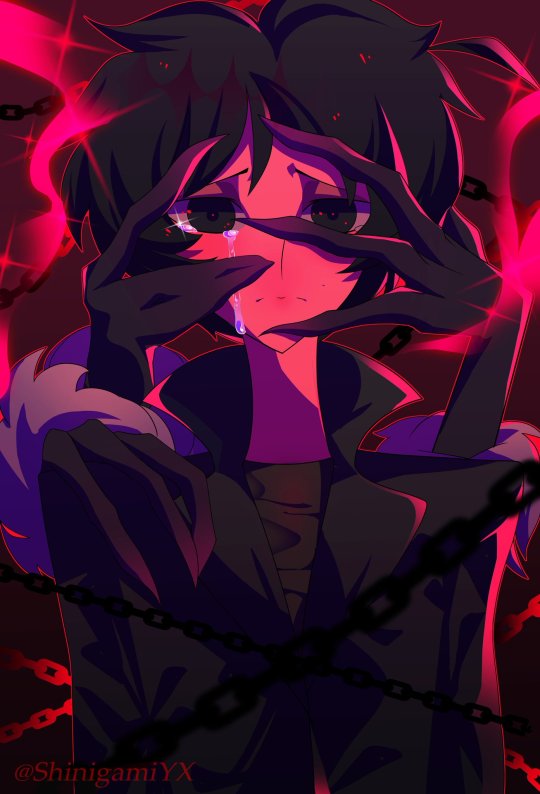
Commissioned Art by @ShinigamiYX
She's a leading character in my longfic, Thicker than Water. After a botched hit, Liz flees through a portal into Hell where she reunites with her father who had died when she was a child. Together they go on a quest to find out which demon had put the hit on her to have it removed so IMP will leave her alone.
I really got to know Liz and her skewed sense of justice and how she uses her role as a humanitarian to take revenge on stand ins for her pain and trauma. I've written her as a sociopath while having a crooked moral compass. She's likely the most complex character I have ever created. She's literally one bad day from becoming an outright villainess.
She also holds roles in TTRPGs I've run with friends online. In my current game, I've turned her into a BBEG, not as a demon, but as an angel called The Radiant.
This has led me to creating a new character upon the arrival of Netflix's Devil May Cry 2025.
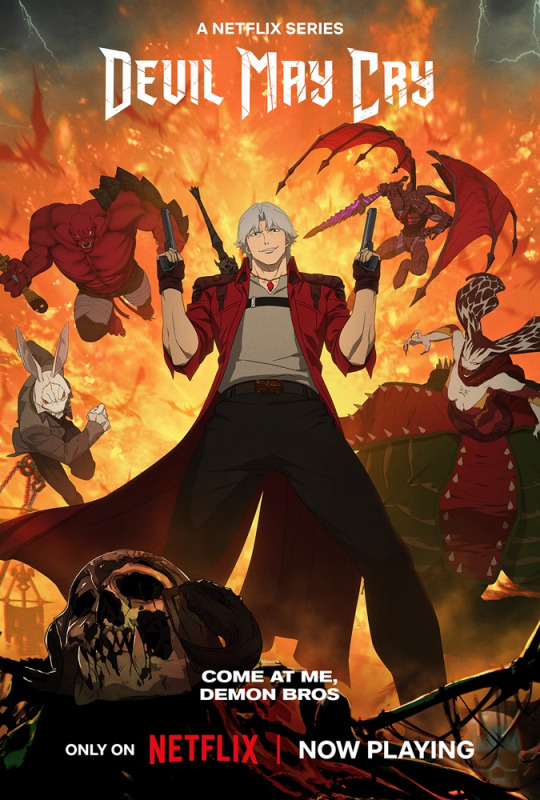
I know there's controversy around the show, and while it does have flaws, I love it. Especially the main villain, White Rabbit.
If you've been following my writing, you know how much I love villains and writing them.
So I had to try my hand at writing an adult, complex scene between White Rabbit and an OC. Not Liz, but the Radiant who emerged as her own character in my psyche.
I originally meant for the Radiant story to be a single one shot, but it blossom . . .or festered . . .into another story; a story I've been wanting to tell, but never realized it.
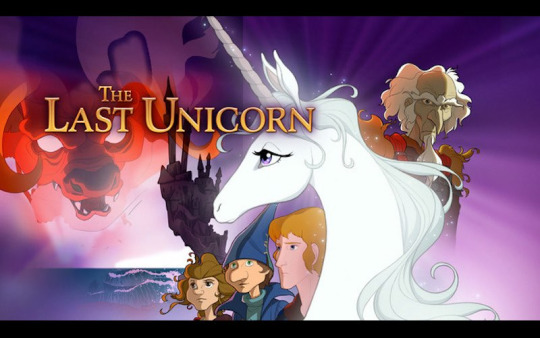
As a kid born in the 80s, I grew up with the Last Unicorn as my favorite film. I've rented it countless times from the video rental place, and it's a film I can drop everything to watch again.
When I learned the film was based on a novel, I hunted the novel down at the public library and read it from cover to cover within a week during summer vacation.
Why am I talking about The Last Unicorn and what does it have to do with the Radiant?
The scene that stuck out for me the most is when Unicorn is transformed into a mortal woman and it nearly drives her insane since she's experiences emotions immortal creatures don't have.
It's called the Broken Angel trope, where a fantastical or immortal creature looses their power or becomes mortal. I've always been intrigued the concept of a creature who operates on a different plane, with its own sets of rules and mortality suddenly gets thrust into a mortal existence and must learn how to deal with concepts of pain, regret, and fear.
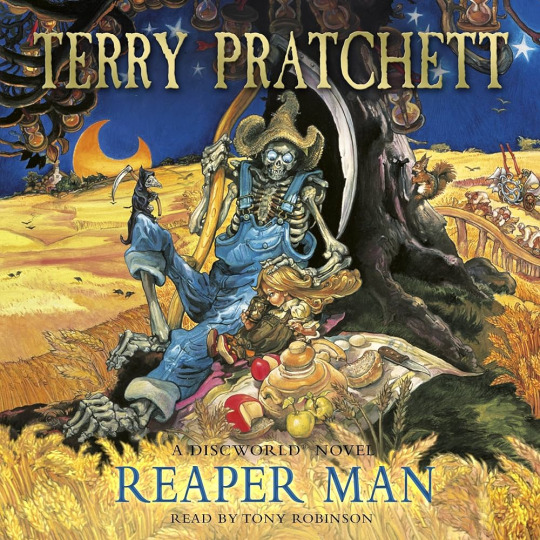
This is scene also in the Reaper Man by Terry Pratchett. Death, a popular character in the Discworld novels, is forced out of his job as the Grim Reaper and is given a mortal life. He takes a job as a farm hand for an elderly woman and must learn how to live as a mortal man. He also faces his own mortality and the fear of knowing one day he would die.
While it's a fun satire novel, some of the themes really hit home for me. It's an immortal learning what it is to be human and to appreciate the things that makes us human.
Which does bring us to The Price We Pay.

Art commissioned by @TheOgress
The Radiant, an immortal powerful angel, with a taste for wine and attractive men, gets involved with the White Rabbit only to be savagely betrayed when he drugs her and steals her divinity and cuts off her wings.
While the majority is told from White Rabbit's POV (he's fun to write btw), we are given insight into Radiant's perspective on her loss and the pain of betrayal.
She's forced to comprehend the concept of pain and fear. Her anger is only a shield to protect what's left of her soul from the humiliation she endures in becoming dependent on her assailant and captor for basic needs he had never needed like food and shelter.
Before, she had chosen partners based not on appearance, but because there's a brokenness them so they need her to make them whole, so she can fix their problems and be their 'angel'. This isn't something she's intentionally doing or being malicious about it, but she wants to be needed, to be loved, and she believes if she's fulfilling a need, then she fits into that partner's life.
However, after the White Rabbit divests her of her wings and divinity, she's the broken one who relies on him to fulfill her needs. She's hurt, angry, confused, and scared. She doesn't know how to regulate her emotions because she never had to. The Radiant has become a toddler with her emotions, having tantrums when she's unable to communicate her needs or completely withdrawing into herself when she's hurt or humiliated.
I'm still getting to know this new character and I've enjoyed writing her. This post is a little bit of a character study for her to help me get a better grasp on her character.
#fanfiction#character study#hazbin hotel#thicker than water#devil may cry 2025#white rabbit devil may cry
7 notes
·
View notes
Text
bundletober #13: blazing hymn
alright i've fallen behind on bundletober (the series of blog posts where i review and talk about a ttrpg i got in a bundle every day) and am hoping to make up the difference by putting out two entries today. this is the first one, and i'm looking at the mecha-piloting, synthetic-armour wearing, blaspheming-against-God-and-his-angels game blazing hymn by peach garden games.
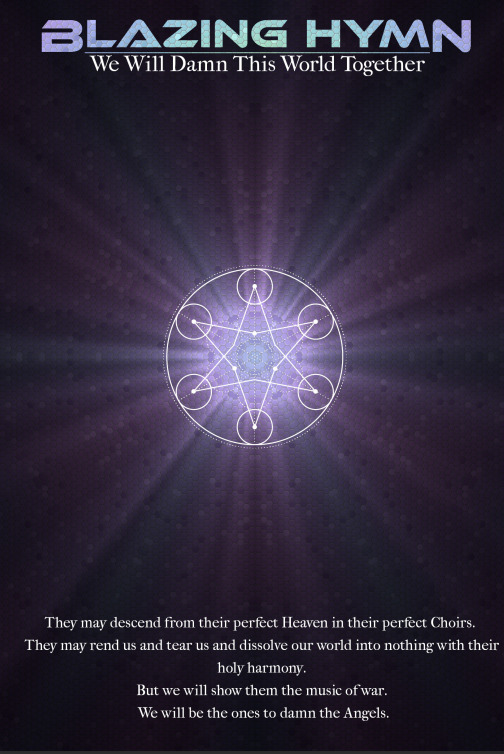
now sadly this game is not a lyric/blackout poetry game about rewriting church hymns to be about gay sex. someone should make that btw. no it's just about wearing highly advanced battlesuits powered by the song of your heart to kill aliens with weapons of pure energy. which is about as cool.
first off, the layout of this game is unique and stylish. there are hexagons everywhere:

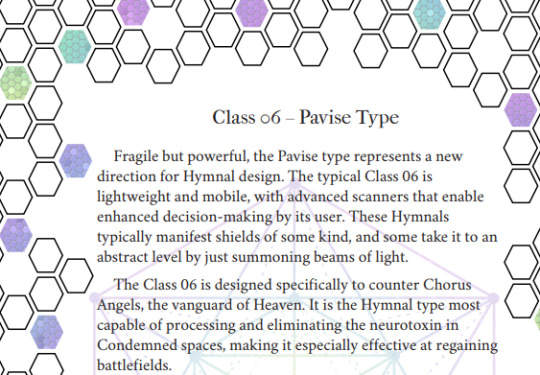
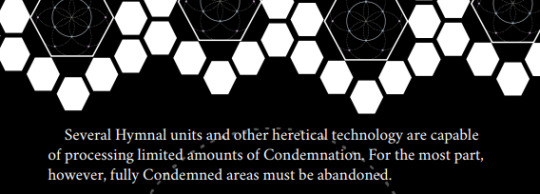
the game puts sparse splashes of dreamy pastel colours amid a constantly shifting set of black and white hexagons. it gives the book a visual identity that is at once both visually distinct and also changing massively from page to page. it's a really cool way to mix things up and keep you wanting to turn the page if just to keep seeing what the next one even looks like.
what's the game about? simple. angels have come to earth to destroy it badly. with the power of song, young people can power specially designed battlesuits, called Hymnals, that when not activated collapse down into crystal necklaces. it's a pretty anime concept--the game is pretty open about being inspired by Evangelion and Symphogear, neither of which i've actually seen--but it's cool as hell. the aesthetics of the layout really help bring the aesthetics of the game itself, of technology and ethereal mysticism merged into one thing, to life.
the game uses a pretty simple three-stat system where you build dice pools with a state relevant to an action and can get a full success, mixed success, or failure, depending on what you roll. your characters have two resources, Health, which is what it sounds like, and Gain, which is essentially magical power. because you can swap Health for Gain and Gain for Health at a 1-1 ratio with no restrictions, i'm not really sure why they're separate things--seems like a missed opportunity to not only simplify the mechanics but also create a strong mechanical narrative element by making Gain the only thing that keeps you going--once your song is silenced, you're out.
to create a character, you pick from one of six unit classes--here's where i'd describe the six classes, but honestly, they don't quite feel distinct enough. a lot of the powers you can pick for each hymnal class feel very similar, or are outright overlapping in a lot of cases. this isn't necessarily a bad thing, but the descriptions of the hymnals, while trying to clarify their combat roles, all end up seeming to repeat themselves or say contradictory things. i think some direct ties between those descriptions and their mechanics would have helped--i'd find it a lot easier to remember that, for example, the 05 Xyston type "brutal in combat" if that flavour text was followed by a direct reference to one or more of its abilities. they do all have pretty different stats--which, in a game with a very simple and elegant combat system, means i'm confident they play very differently once you hit the table. but just looking at them, as a prospective player, i struggle to tell the difference.
i don't have that problem with the next character creation mechanic, though, which is choosing the songs you sing to power your hymnal. each song, as well as a thematically appropriate set of stat boosts, also prompts a pair of revealing character questions. they're the kind of mechanic that i want to get my hands on because they make it fun to create characters, giving real mechanical expression to the emotional fundamentals of who they are.
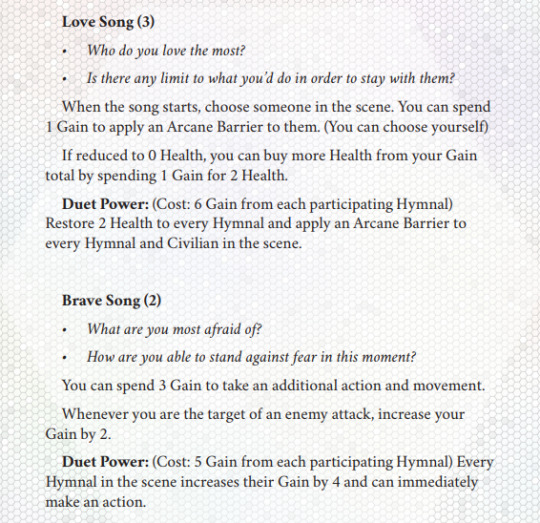
the combat system itself seems really, really good. it's astoundingly simple--you're encouraged to use a map, but there's no fiddly grid or distance tracking, just the ability to move between being Close, Near, or Far from an enemy. it keeps the numbers low to keep it getting silly and doesn't bother with any of the unecessary bookkeeping and fiddliness that plagues TTRPG combat as a whole. no initiative, no separate turns--there's a 'player' turn and a GM turn, and during the GM turn the GM picks from enemy's listed actions until they've done two for each player. players can use their abilities on the GM turn, and the game encourages the GM to take enemy actions that wil lforce them to--so nobody's ever standing around twiddling their thumbs waiting for the whole table to rotate back to them, and having a lot of enemies doesn't mean the players listen to the GM talk for fifteen minutes.
there's two unique mechanics that i think are very interesting-- Civilians and Condemnation. Civilians are--well, exactly what they sound like. on their turn, players can use an action to evacutate up to 5 of them. this extremely small and simple mechanic is fucking genius. so many games tell you they're about saving innocent people, but yet the only mechanical verbs you have to interact with anyone are violent ones. as elaine scarry says in the body in pain:

so in a way i think blazing hymn puts its money where its mouth is in a way very few combat rpgs with emancipatory or heroic aspirations bother. angels are said to attack populated areas--you're sent to preserve life as well as destroy the enemy. it makes the game feel fundamentally different, like despite the questionable ethics of hymnals (after all, they only work on young people, who then have to be sent into deadly combat situations) there is something heroic you can do.
the second cool mechanic is condemnation, a reality-warping toxin that angels use to destroy the places they're sent to. this rocks because it adds a ticking timer to the battlefield, a passive threat that forces the player characters to be proactive. if condemnation gets too high, not only is the fight going to get harder, but civilians are going to die en masse. it's a great piece of game design that gives the GM a great lever to pull for pacing and urgency.
i also really like that one of the steps of the GM turn is to 'change the situation', whether that means something happens in the narrative or something on the map changes (a train arriving is the example the book gives) or more angels attack. in general, one of my biggest complaitns about d&d is that unless a DM takes it upon themselves to design additional mechanics and encounters outside of anything the game actually gives them, combat inevitably turns into two lines of people hitting each other with sticks until one of them dies. i love dynamic, progressing combat, combat where the stakes change moment to moment. and blazing hymn delivers.
anything else? oh yeah, the angel designs are cool as fuck.

god damn. anyway despite a few minor issues with the hymnals themselves, the core of blazing hymnal is fucking good, a nice tight and razor-sharp combat system wrapped up in pulsing pastel crystalline aesthetics. if you like cool anime fights and like having the rules to back it up but hate complexity, crunch, and tedium, this might be the perfect game for you. it's certainly given me a lot of cool design ideas to take foreward into my own projects.
blazing hymn is available for purchase as a digital download through itch.io
87 notes
·
View notes
Text
what's the book for? part 0
youtube
I watched this three hour video! It is primarily a critique of the story games/Forge mode in TTRPG design, seeing it as the fruit of a condescending behaviourism, which to youtuber Vi Huntsman is painfully reminiscent of the 'Applied Behaviour Analysis' abusive treaments that are often applied to autistic children! Oof! Quite a charge...
...though it only gets there after the first hour or so! There's a segment where they do a stage production of an abridged version of a segment in Sunless Skies!
So... despite 'three hour video essay titled Art, Agency, Alienation' being kind of a punchline in itself, despite occasionally the kind of indulgence you tend to only see in got-way-too-big video essay channels, this video is actually pretty legit. I used to be quite the story game partisan and this is perhaps the best critique I've seen of it!
I think the thrust of Vi Huntsman's critique has merit, but it ends up feeling... honestly broader than I think they meant it - many dimensions seem to apply to almost any printed TTRPG. I also found their conclusion, which calls for more adventures and similar to support the 'folk art' of RPGs, extremely underwhelming - more a statement of taste than an answer to the blistering criticisms of the previous three hours.
So here's my own attempt at an answer. Or at least to lay out the premises we'd need to reach an answer, I'm not there yet!
tl;dw
Let me try and break it down into a tl;dw version. (I'll brush past the lead-in which talks about The Stanley Parable and Severance, used to frame the discussion.)
First up, ABA is an abusive practice inspired by radical behaviourism. In ABA, a behaviour analyst decides how a child should behave, and applies crude reward/punishment structures to get the child to do as they want, without trying to understand the underlying reasons. For example, an analyst may try to stop a child covering their ears when flushing the toilet, even though this is painful for the child. This analogy runs through the video. It is clearly quite personal for Huntsman, who I'm fairly sure is autistic themselves, and apparently worked at some point in attempting to apply the 'treatments' cooked up by the behavioural analysts.
Now, there is a perspective in game design that believes that the designer's responsibility is to create structures of rewards and perhaps punishments to push a player towards a specific intended experience - i.e. 'incentives'. In this light, game design is envisioned almost as a kind of spooky mind control to create behaviour in players, though the methods imagined to do so are in fact very crude.
The other element Huntsman introduces is the notion of 'Suitsian games', after the philosopher Bernard Suits, which are self-contained rules structures creating interesting obstacles to reach some kind of arbitrary goal (for example: capture king, place ball in hoop), where the interesting aspect is the new 'agency' created by the limitations of the rules. Huntsman argues that TTRPGs are not Suitsian games, and it's a big mistake to act as if they are.
They present some examples of a disdainful attitude among designers that players are like children whose behaviour is determined only by the game itself, despite all evidence to the contrary. A particularly damning example is a podcast episode in which a game designer who is also an ABA behavioural analyst attempts to explain how games should more deliberately apply direct incentives in their design.
This attitude, Huntsman argues, results in games (here books you can buy instructing you what to do) which attempt to meticulously shape play (the actual thing that happens at the table) to push it towards a very specific intended experience, often by rigidly defining processes for nearly every stage of the game, similar to a board game. This undercuts the open-endedness of TTRPGs, the major strength of the medium.
The roots of the pernicious ideology, in Huntsman's view, go back to the Forge forums, a cultish forum about game design run by a terribly arrogant man called Ron Edwards, known for Sorcerer and Trollbabe. Many of the major game designers active in the indie scene today come from the Forge, and they tend to somewhat nepotistically promote each other, including writing a very self-back-patting textbook.
In a section termed 'the can of worms', Huntsman suggests that elements like the 'agendas' and 'principles' and 'GM moves' amount to designers taking undue credit for player creativity, with designers claiming that fairly boilerplate GM advice framed as rules is what makes the game work, with the corollary if the game doesn't work you weren't following the GM rules properly and thus weren't really playing the game.
Some of these games tell you off for interesting ways you might hack or vary their rules, insisting that they be interpreted strictly and narrowly to get the 'intended' experience
This is all about selling a product - the idea that you need this specific book in order to create a certain kind of experience, when in reality the book does very little to actually contribute to the 'folk art' of playing an RPG together.
The main example used to illustrate all this is Root: The RPG, a TTRPG adaptation of the extremely popular asymmetric board game about forest animals having a civil war. The TTRPG is printed by a company called Magpie Games which specialises in PbtA designs, probably best known for Masks. They tend to do very well on Kickstarter, but their games - often IP tie-ins - are not especially memorable. Vi Huntsman praises the original board game, but has little positive to say about the TTRPG spinoff.
From what I saw in the video, Root is definitely a strong example of a shallow PbtA game which borrows the surface-level forms of Apocalypse World (moves, agendas, etc.) to create something bland and unengaging. It commits many design sins - far too many uninteresting moves, a dearth of evocative prompts to get you into the idea of the game, locking certain reasonable actions to specific playbooks, repetitive prose, a lack of conceptual clarity, dogmatic insistence that its rules must be followed to the letter... Clearly we can all skip this game.
But...
the role played by a roleplaying book
What's more interesting to me is the broader critique.
The video does not directly address Root's obvious parent Apocalypse World in much depth. Huntsman notes that most of Root's ideas are cribbed from there and that Magpie Games have been less and less likely to acknowledge Vincent and Meguey as time goes on; the pair are also included in the Pepe Silvia wall used to illustrate the reach of the Forge. However, they do not really address whether their criticisms apply to Apocalypse World.
To my eye, Apocalypse World is still a lot better than almost all of its many, many imitators. Part of that is the strength of its prose - and that is actually very important, for reasons I'll get into. So I think it would be better to look at the best of this tradition, rather than its worst.
But before we can get into that, the real question for me is this. What is the relationship between the paper object in your hands or PDF on your computer, and that mystical thing that happens when you and your friends gather around a table and tell a story together for four or five hours?
Begin series.
23 notes
·
View notes
Text
✨ Rainbow Factory TTRPG! ✨
HIII!!!! As promised here is my silly little reskin of KOB (kids on bikes/brooms)!!! :o] <3
EDIT: This post got a bit long eek!! sorry!! if you just wanna see the silly stuff I did then just check out the links! You can ignore all the other text on this post jajaja!
Mini Rule Book ( for GMs & Players!)
PDF Version!
Here is the document I gave all my players beforehand! This is a simplification of all the KOB rules, character creation process, and the worldbuilding for Unicopia! Please feel free to use as much or as little of it as you like for your game! It goes step by step through the character creation process and has a wide variety of examples and references. I try to be as thorough as possible but ofc I may have missed something! Please feel free to make up what i miss or shoot me a message if you're really curious jaja!
Here is a jpg of the Player Character Sheet of needed! :o]
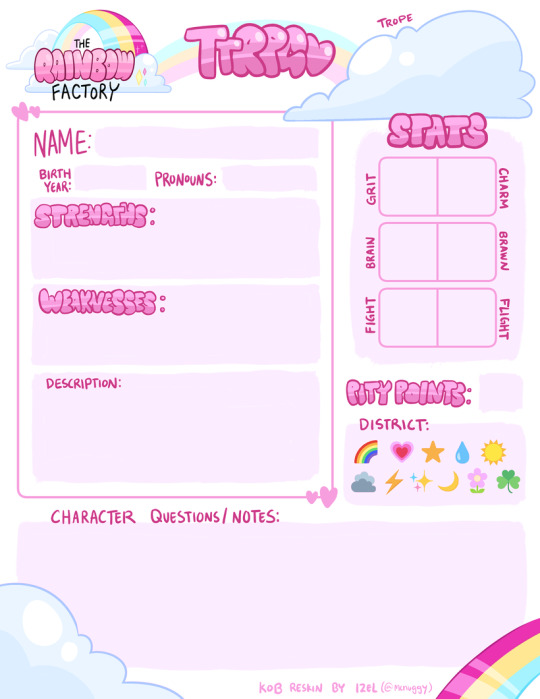
RFTTRPG: NPC Stats & BG Characters! (For GMs!)
This is what I used while GMing! Feel free to use these as you like! I tried to keep it simple and loose for the big characters like Hev and Trixie! And even simpler for the background characters. I didn't give the BG chars any stats as I knew I wouldn't need them for the one-shot I was running but please feel free to make your own BG chars, and stats, and all of that good stuff!
I also have a rough RF building chart for exploration! Our campaign was set inside the Rainbow Factory so it felt like a good idea to make this for my players! However please feel free to set your one-shot anywhere else in Unicopia! I hope to make a map of the districts one day to add to the mini rule book later on! :o] You can also set it at another Happiness Factory such as the Tear Factory or Heart Factory! You could even have your unicorns visit Earth! The world is your oysta! ♡
Overall I tried to keep everything super simple and clear for both myself and my friends! I imagine other Factories in smaller districts would be much smaller than this but this is a rough idea of what I think most of them would sort of be like!
RFFTTRPG: One-shot Ideas & More! (For GM's)
I love love loved using the KOB system and reskinning it for my silly little world! and I love when a TTRPG gives you nice sort of rules to follow while still being super free and open in other aspects! It made it easy for me to just come up with a simple problem/plot for my players! However I know coming up with something from scratch is also super intimidating and overwhelming! So here is the idea I did, along with some others I've thought of for fun! (and might even do in future games jejeje)
Kid on the Run! This is super Monsters Inc inspired. Have the party over at a Factory for any reason you choose. I chose a tour/ted talk hosted by the lovely Trixie! It can also be a company party, or breaking and entering, or they already work there, etc.! Have one of the portals go haywire allowing a child to enter Unicopia! It's now up to the party to not only capture the child but return them back home safe and sound to the human world! All while keeping the child secret from the rest of unicornkind! RF: Happiness Special Forces The Counsel has decided to create a special task team in charge of going down to earth! Go undercover and stop those who cause great risk to Unicornkind! This could be stopping a huge evil corporation that is creating an excess amount of unhappiness, reducing the magic of Unicopia. Or having to go in and save multiple children in danger such as a field trip gone wrong! Or making an adult human who remembered their childhood unicorn forget about them again before things get dicey! Your players will have to keep their existence as unicorns a secret, all while saving their world, and exploring Earth as characters who may be unfamiliar with humans and their ways! Unicorn Hunters & the End of Unicopia What if unicorns biggest threat finally found out where they had been hiding all this time? and not just knew but had access to a portal? It's up to the players to stop them at all costs and save their world. A high stakes adventure full of lore, magic, and potential unexpected allies! The Daily Life of a Field Op/Happy Tech This is more of a slice of life concept! This would work well for smaller parties of 1-4 Players! Have your Players form teams and deal with the daily troubles a helping a kid/teen/pre-teen as a Field op or Happy Tech! (You could even have one of your Players play one of the kids themselves!) While still balancing their social lives, self needs, etc.! A look inside what it's like for Unicopias most essential workers, their interpersonal dramas, relationships, etc. Great for those who love character centric collaboritive storytelling!
ANYWAYS!!! Sorry for the ridiculously long post </3 I just wanted to cover all my bases in case someone decides they wanna play this reskin!! If you do end up playing pleaseee let me know eeek!! very very exciting!!! <3 regardless i hope you have fun looking at all this silly stuff I did to make my friends smile and laugh :o]
You can check out our one-shot over on my Patreon yahoo!
#ocs#the rainbow factory#rf:ttrpg#ttrpg#homebrew#kids on bikes reskin#i know it might seem weird to play w my world and ocs but please know you have my whole loving permission#kill trixie. kiss kay. explode the world#do whatever as long as you are having a fun and silly time amen
23 notes
·
View notes
Text
Get to Know Your Moots Writeblr Interview
Was poked by the wonderful co-writers of Sunset @sunset-a-story and @touloserlautrec. Go read their posts here and here!
On the Tumblr Writing Community
How long have you had your writing Tumblr/Writeblr? A short eternity (first post is mid 2022)
What led you to create it? Was very bored at work and wanted to share some recent stories. Also I had never tried social media before, it this looked like the most interesting place to try it.
What’s your favorite thing about the Writeblr community? Getting to see other people's imagination unfiltered. I've read plenty of great works before, but it was definitely an entertaining first to see the author later publicly say "this is my favorite little guy, can't wait till the next time he suffers."
What’s one thing you’d like your mutuals to know about you? I constantly feel like I'm bothering people and or feel self conscious when talking about me/my stuff, so bare with me hah.
Is there anything you’d like to see more of on your dash? Just some really unhinged stuff about y'alls stories. I want to open my phone and see someone discussing the seven major heresies dictated by some cabal of priests only to later realize "oh, this is someone's fever dream, not a history lesson".
What tips/advice do you have for someone who made a Writeblr today? Interact more, take up the offer of "open tags" on other people's posts. Also throw your ideas onto the table for other's to look at, we all seem to love just watching someone go off about something they love.
WIP it Good
Which Works-in-Progress (WIPs) or writing projects are you noodling about, lately? Been in a bit of a writing drought. Lexical is always getting worked on, more so the TTRPG stuff than any story right now though. I've had a few projects pop into my mind and leave over the past while. Have a cluster of characters I can't get out of my head, but no narrative or setting to properly put them into. A god of violence and the man that cut her out of himself, a cultish vampire philosopher and his favorite little guy (little guy has a knife). Surely something will come of this, or they'll continue to just exist in one-off stories in my own head. Amber Hill, specifically The Lawman, is still somewhere in here but it's been struggling to come out for a while. Been trying to find Lars' voice as a POV character.
How long have you been working on them? I've been working on something based in Lexical since mid 2022 (huh, exactly around I first posted here); the other guys are new and only a few months old at most.
Do you remember what inspired them/what got you started? Lexical is a can of worms. The short answer is that my irl DnD group wanted to play something more free form and creative leaning than what our 5e campaign was allowing, so I said fuck it and started homebrewing a system based in a world I have vague ideas about. The long answer is that Lexical is a sequel to a Pathfinder campaign titled "Demis", which was about fantasy super heroes. It was heavily inspired by My Hero, Worm, and inescapably Homestuck. So when it came time to make a whole new system for these same players I took some concepts that worked in Demis, applied some occult-adjacent philosophy I was/am into, and ended up with my years long passion project. Atem and Sadaf were born out of my growing need to explore violence as a concept, philosophy, and inescapable existential crisis. The Vampire and his thrall Ish spawned out of a desire to have a toxic romance to think about. And AmberHill was inspired by a desire to create something cozy and occulty. Ended up being SCP adjacent but maintained the idea of a small community that cares about itself.
How much time, in your best estimation, do you spend thinking about them? Lexical- not enough, I'm lucky I have at least some productive thoughts throughout the day. Atem- too much, his tired ass sat down in my head and I've been too polite to ask him to leave.
When someone asks the dreaded, “What do you write about,” question, what do you usually say? "Urban Fantasy with science fiction elements"
What do you want to say (if it’s different from what you do say)? "My dissertation on the semi-real building blocks of both physical and social reality, also wizards punching people."
Let’s Rotate Blorbos
Name any characters you created. We've got the original Lexical boy Samuel Smith, Atem and Sadaf who you've already heard of, Lars DuPont from Amberhill.
Who’s the most unhinged? Sadaf.
Who comes the most naturally for you to write? For whatever reason Samuel's self-loathing PI perspective just comes very natural and is maybe someone I should write more about.
Do you ever cringe at them? Nah
How much control do you feel you have over your characters? Depends, my mind does not wonder so much that I don't feel like I am ever not in control. But who I am able to focus on tends to be a matter of debate.
Do you enjoy people asking questions about your characters? Yes absolutely. Characters, worlds, magic systems; I'll rant about any of them given the chance.
On Writeblr Engagement
What makes you want to follow another Writeblr account? A combination of preferred genre (urban fantasy), shared interest (books/games/table top). Also if they have Scribe as part of their name it's just an auto follow.
Do your mutuals’ characters occupy space in your noodle? There's a few. The telepaths from Sunset and their many ways of being terrifying are the first that come to mind. Since I already mentioned the scribes I'll go ahead and tag @scribe-cas , @covenscribe and leave the rest of the tag open. Here is an empty template
8 notes
·
View notes
Note
hi I saw your post saying your ask box would be open to offer TTRPG suggestions/advice and I was wondering if you could help me out! I play DnD (shocking, I know) because it's what I know even though it doesn't give me tools to do what I want to do. It's hard to switch when so much of my stuff as a DM in my homebrew world has been set up to work with it, but I'm hoping to find something to switch to anyway.
My game has become a sort of module on its own in that I run the same homebrew story with new groups, so I know basically the world from the ground up. I'm hoping that there's a system out there that has at least ok combat but primarily social stuff. It's high fantasy with magic being common enough that magical lights are used for business signs in the town square. The game heavily replies on social actions, talking to NPCs, getting info from them, making agreements and deals, and a little bit of "we gotta kill this guy without being caught because he's fucking awful" or just plain killing enemies like dragons in general. Gods are in the story and exist partly powered down due to plot reasons, so a game that's meant for a world without magic or gods wouldn't work. Combat is to spice up the game, not the main focus in the way that DnD tends to set its rules up and its assumption of fighting being the man way characters interact with the world.
I looked at Pathfinder and while it does offer a lot more in that regard, it was far, far too crunchy with too many options and overwhelmed me. I saw that Foundry devs are working on a system named Crucible which seemed really neat with the branching paths for players to create characters beyond the railroad of a class limiting them severely in options, but it's incomplete and that doesn't help. I honestly don't know where I'd start looking for something to replace DnD as a system. I've tried looking a bit but most stuff that comes up is Kids on Bikes or Powered by the Apocalypse but the former has assumptions are are irrelevant by design and the latter is too open ended.
Thank you in advance! I hope I didn't send too much info or bother you!! (Side note: This was sent from my main blog since Tumblr forces main blogs to be the ask sender, but I don't use that for interaction, so any responses I have will be from my side blog RachRiposte.)
I am so sorry for missing this! It got lost under a deluge of requests for money, but I really appreciate the ask!
It makes a lot of sense that PbtA would come up; I agree that Kids on Bikes is irrelevant, and while I can’t think of any particular PbtA system that would be a good fit, there’s some mechanical elements from them that could help with a homebrew temporarily while you try out new systems.
I’m thinking of stuff like Thirsty Sword Lesbians’s and Glitterhearts’ investigation mechanics, where on a successful roll you can ask 1-3 questions (depending on your result) from a list. The GM always answers the questions honestly.
TSL’s:
What are your feelings towards _____?
What do you hope to get from _____?
How could I get you to _____?
What do you love most?
How would you feel if I _____?
Glitterhearts’:
What happened here recently?
What’s about to happen?
What’s the most dangerous thing here?
What’s the most useful thing here?
What needs to be protected?
What here is not what it appears to be or what are they trying to hide?
Who is in control here?
What new and useful information can I gather?
What sort of creature is it?
TSL also uses Strings, which might be helpful; those can represent favors owed or agreements made between characters, or they can just be “I know you well enough to offer you something you want in exchange for something I want.��� Let me know if you want more information on that!
These mechanics might be too broad or open-ended for your purposes, though. Are you looking for something that’s more like a basic framework of mechanical ways people can get information from NPCs or their surroundings, or something that gives players more specific actions to work with? Or something that relies more on player skill in asking questions or interacting with NPCs/solving conundrums/putting clues together?
Also, just to confirm — it sounds like you’re looking for something with politicking and socializing rather than a mystery to be solved by interacting with NPCs for clues, right?
TTRPG question recs never bother me :) Please feel free to provide more information if you can!
Edit: forgot to ask — are the PCs also using magic for social or investigative maneuvers? Should the system take into account things like mind-reading or forced truth spells, or is all that less relevant?
4 notes
·
View notes
Text
It Begins / How do I introduce over six months of development in a single post?
Salutations, I'm a gay nerd and I wanted to make a fantasy ttrpg with a setting that panders to myself and anyone else who might have my taste so here we are :)
The ttrpg in question is Prima Materia, and I've been working on it for a while and making ok progress so I figure I should probably start a devblog (that's what this is) so I can finally start sharing it rather than keeping the entire project within my own circle of friends, never seeing the light of day beyond that. Particularly because I'm finally playtesting some aspects and want to actually release it into the wild someday so people can share and play it as they please.
Ah, so you've clicked the keep reading link? OHOHO you fool I shall unleash an infodump of epic proportions onto ye!
*checks notes*
Right I should probably introduce this project in more depth and explain how I got to this point, and why I'm working on it in the first place. A chronological account should suffice.
Back in the days of yore (2020) when I was getting into ttrpgs for what would become the third time I had first gotten into them (previous times don't count), I was trying to create a setting for DND so I could become a DM for the first time, fueled by the disappointment that every other game I'd been a player in ended after about 2 sessions max. Making an entire setting is of course not recommended for first time DMs, particularly ones that ever want to play the game, but of course this did not dissuade me for I am built different [incorrectly].
I built a tidally locked planet for that campaign, filled it with lore and towns and cities and an apocalypse that happened some time in the past. All was well, and the campaign lasted about a year before the holiday season came and caused it to dissipate. Reduced to atoms. By that point I had been homebrewing creatures and items for my homebrewed setting, including new playable species and subclasses. Homebrew is like a glue trap, and brother, I'm a dead rat.
After that campaign ended the OGL scandal hit (among many other things I won't go into depth about) and I saw the need to create for myself a place where I can always and forever write fun stuff to share with others, in a system that I have control over. After all, integrating the system and the setting, building them explicitly to serve each other, would allow for much more creativity.
That setting still exists on my hard drive, and while I do import some of my original work for it into Prima Materia's setting from time to time, it is dead and shall remain dead until such a time I can completely re-write it to make sense in Prima Materia. But it's so ingrained with DNDs lore that it honestly would be more like an homage to the original campaign I had with my friends.
So, I got to work. I started, of course, with watching a million videos on the subject of making a ttrpg and not actually writing anything down. But eventually, an eternity later, I was ready. I started doing some science-adjacent worldbuilding to build the initial planet for the setting, in which the initial setting would be. I created continents that looked mildly plausible, charted out ocean gyres, wind patterns, and finally climates. This continued for a while, and I made the playable species and started figuring out where on the continents they would have evolved so I could figure out what their cultures would eventually be in the modern day after 10,000 years of history.
In short, I had worldbuilder's disease; and while I did make some decent progress on mechanics like dice rolling, some combat, skills, attributes and stats, it started coming to a head when I convinced myself that I needed to make a minimum of five conlangs in order to name seven continents (and various cities).
Enter stage left, one of my friends who thinks my project is cool but recognizes that I am not getting much done. This friend, Spinz (who I hear has their own project coming down the pipeline by the way >w>), has become my Screamer of Tasks and is reminding me of the important things to focus on to actually make the ttrpg a reality some time in this millennium. Thanks to their help, I've been able to get to the stage where I am able to inflict my project onto my friends so that I may playtest mechanics and generally have an otherwise fun time with them.
So what actually is the setting? That seems like a lot of buildup and waffling.
True! I felt it was important to explain where the project is coming from. As for the setting itself, I don't think I can do better than the introduction I already wrote for it in the PDF. So here's that.
After several hundreds of trillions of years the last known natural stars in the universe began to die, heralding the end of the stelleriferous period and the start of a new age full of the neutron cores and black holes they left behind. But the gods this universe spawned would not let their mother die so soon. They created new stars fueled by their own Prima Materia, the building block from which all other substance comes; a pure marriage between matter, energy, time, and thought through which the manipulation and creation of physics itself is possible.
The gods created massive bodies for themselves in orbit around their stars. Some fell into a deep sleep, some are content to watch as the eons of time give way to the fruits of their labor. Others still engage in grandiose projects of a more personal nature. But they all continue the work which allows for life to once again evolve in the small pockets of the universe which now continue to defy entropy, a constant stream of Prima Materia flowing from their bodies into the stars that they orbit. Some day, they too will reach the stars.
But that's old news, and there are none left alive to remember it but the gods themselves. In the world of Prima Materia, you play as a relatively normal sapient creature in a smaller corner of reality that has much smaller problems to contend with. Brigands, societal clashes, ancient ruins, dragons, and the wayward extra-universal threat to the planet. Many societies have also been able to harness certain powers of now free-floating Prima Materia through a process often known as "Alchemy." Alchemy, an involved study which requires just as much craftsmanship as it does ingenuity, has opened up an entirely new science for societies to develop in this age of the universe.
Who will you be? What legends will be written in your name?
There are several playable species in the setting, all of which have various distinct cultures. Koura, which are basically giant lobsters; Sepia, which are basically giant Cuttlefish; Humans, which are basically giant chimpanzees; Entari, which are strange bird pterodactyl things with feathers (they're hard to explain but I will get art I promise); Xente, which are basically giant amoeba (ones that can change their shape to be humanoid of course, what even would be the point if they couldn't); Possum, which are basically... bipedal possums and Ternaki which are basically short technicolor space elves (They believe in God). All of these species will get their very own blog post of course, but this post is hugely long and I'm getting worried about people getting bored so that's all for now.
In the future blog posts won't be this long I promise (hopefully) and they'll be a lot more focused on one thing. This blog is meant to record the development process, write down a lot of worldbuilding that has lived only in my head for too long, and link to playtests.
If you made it this far, holy crap you read a lot of my shenanigans thank you for your time I am indebted to you, truly. The next post will be about Dice Mechanics. Bye.
P.S. If you want to ask questions about Prima Materia (or me) you can send me an ask on my main blog @girlcodedcreature
#indie ttrpg#ttrpg#original content#small content creator#long post#cw long post#tabletop#indie games#indie rpg#tabletop rpg#sci fi and fantasy#thanks @donutboxers for help with the tags#prima materia#primamateria#@sp1n0za
12 notes
·
View notes
Text
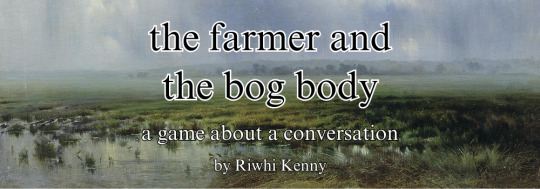
bog tour - countdown to 1 year of games
T MINUS 8 DAYS
Thanks for joining me for this installment of bog tour, where I countdown to my 1 year anniversary of posting TTRPG's I've made! Each day leading up to it, I talk about one of my games. Today's game is 'the farmer and the bog body'!
'the farmer and the bog body' is a two player game where one of you is a bog body and the other is the farmer who just dug them up. You'll talk about legacy, history, fate, and where your lives will go after meeting each other.
Thoughts
I have suuuuch a fondness for this game! It's being slept on I feel!
It was the first game where I didn't write it in one or two days, I had to do a number of sessions writing it. Practicing patience and trying to manage hyperfocus sessions haha.
It uses Morgan Davie of Taleturn's 7 Questions RPG system. I got to see Morgue's game 'The Oracle and the Curse', where he created the system in person when I saw him at a KiwiRPG meetup! Went home and bought the book, and feel in love with the system. I tried to hunt if there were any other games that used it, but alas, I was the second one after the original.
It's a really cool system in which you ask 7 questions between each other total, and at the end of each answer, you choose another question to ask, which leads you down branching paths, leading to lots of different paths to take!
I decided to take the system as used by Morgue in his game where he used it as a way to create a form of plot, and used it in mine as a character/relationship exploration tool.
It was interesting to discover themes as they arose. Trying to think of questions I hadn't thought of before, and themes to follow was a little challenging, but made me creative! The same with small patch of moss, some of the themes arose as I was writing it, like fate.
It was written for KiwiRPG Week 2024!
Fav parts
Some of my fav questions:
What would it take for you to join me in here?
Why do you think you didn’t deserve to find me?
What part of your fate has settled against your chest like an old friend?
What part of the bog felt the holiest?
What last words will you press beneath my teeth as I go?
Why do you still carry horror on your face, my friend?
What is the least holy thing you can think of? How is it still, in a way, holy?
Also the ending two lines of both my 7 questions rpg games are a highlight:
FARMER, READ THIS TO THE BOG BODY: You are out of time, and yet we have so much more time.
BOG BODY, READ THIS TO THE FARMER: You are out of time, and yet we never had any time at all.
Stats
This game has 380 views (9th most viewed) and 49 downloads (13th most downloads). It has 2 ratings and is in 23 collections (9th highest).
'the farmer and the bog body' is a conversation game between the two titular characters, where you discuss your finding each other, your parting, and what the future holds. Get it for $3USD here.
What's next, you say? Why, of course, it's 'bog body, watching'.
2 notes
·
View notes
Text
The TTRPGs I played in 2023: Part 1
With the year coming to a close, I wanted to do a wrap up on all of the tabletop games I have played. While sometimes it can be difficult to get people to play other games, thankfully that was not an issue this year. If I had to guess a reason why, it might be because of the OGL controversy at the start of the year combined with new people starting to get more curious about the hobby after starting with D&D 5e. I don't really have a fancy ordering or ranking scheme for these posts, so I'm just going to write about what my experiences were like with each game. This first part is for the games that most people are likely to be experienced with while the second (and possibly third) will be about all the one page RPGs I played near the end of the year.
D&D 5e
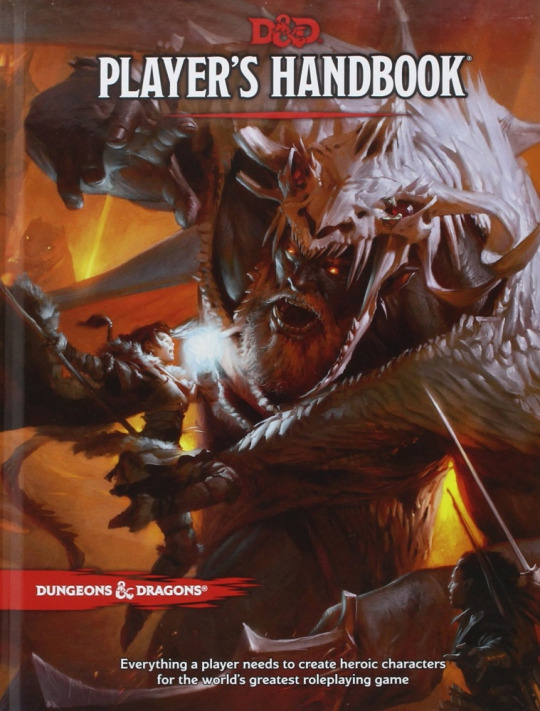
While my interest for the game is dwindling because of WOTC's shenanigans and the fact I have been playing the game for 5 years, I still am enjoying the campaign I have been running within it for 2 years now. My players have been amazing. The ways they engage with the story I have created always surprise me in the best ways possible. Heroic fantasy with a lot of magic is something I love a lot, but I'm ready to start moving to new things. Combat is getting pretty rough as we move to the higher levels mainly because the game's crowd control options are obnoxious to deal with as both a player and a GM. I could always just throw more minions and run more encounters, but that is kind of difficult to do for a casual game when players can't make it every session and we only play about 2-3 hours per session. I love the high magic and power within the game, I just wish it was done in more enjoyable ways.
Pathfinder 2e
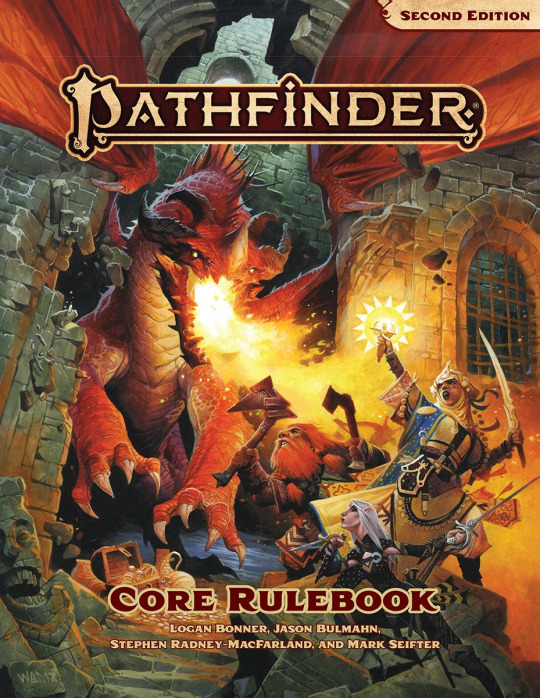
This game is the other TTRPG I've spent a lot of time playing this year. While most people would have looked at me like a crazy person when ever I mentioned Pathfinder, that changed this year. I got to actively be both a player and a GM for this system, which isn't something that happens often. I love the crazy amount of customization and all of the mechanics that want you to work together. How the game handles crowd control is something I also appreciate as well. The three action system allows a lot more variance than "you just lose a turn" or "can't do anything" if affected by something that slows you down. A lot of the keywords can be a pain to remember, but that isn't something I have a problem with. When it comes to heroic fantasy, this is likely to be my go to game after I finish my current 5e campaign. I haven't read much of the remaster yet, but I hear it is fun.
Call of Cthulhu 7e
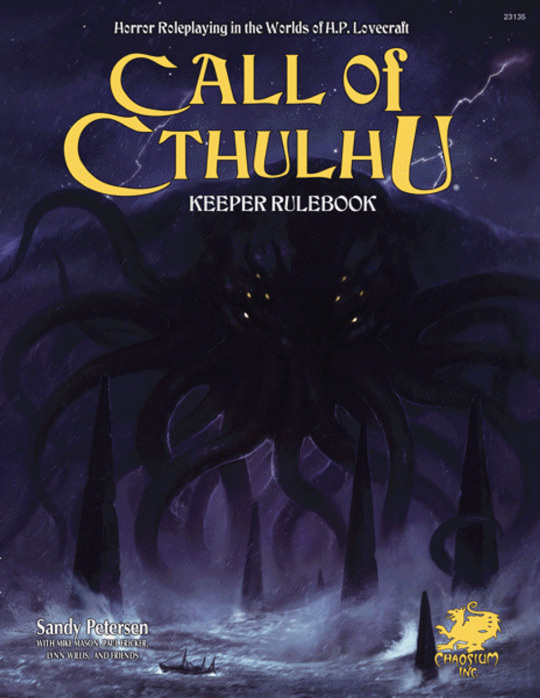
Every October I make sure I run at least one game of Call Cthulhu. This year it was the players try to escape an abandoned mall answering questions horror media. Slow resource draining alongside the constant fear of dying within the blink of an eye always creates an interesting atmosphere at the table. Having the margins of success being so slim on the d100 also creates some extremely clutch moments when the odds for success can be as insane as a 1 in 90 chance of success. I will admit though, I would probably be better off running something a bit lighter for more horror games in the future. I can never remember how the rules of combat functions and when I do I always forget them half way through a fight. This same thing happens whenever a chase breaks out. I plan to continue the tradition of playing this game in October, but I plan on adding more games to my spooky arsenal next year.
ROOT (Pbta)
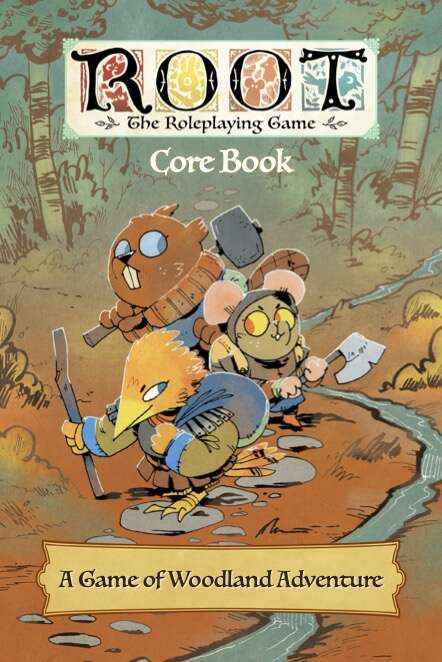
I haven't posted much about it on this blog, but I LOVE the board game ROOT. Asymmetric games are awesome and I love the flavor of each faction. I also might be extremely biased towards anthropomorphic animals. I haven't read many other Pbta games so I can't compare it to other games based on that system, but I can say it is an enjoyable experience. It does a great job getting players into the role of a bunch of animal scoundrels who do what they wish. While a bit clunky, being able to see the consequence of one's action with the forest changing and gaining new moves that involves one's reputation are things I love to see. My players always had a habit of trying to do the jobs they were hired for super professionally only for it to devolve into them all transforming into arsonists. I imagine my view of this game is extremely biased because I love the world and board game its based off of, but I would recommend giving this game a play.
Monster of the Week
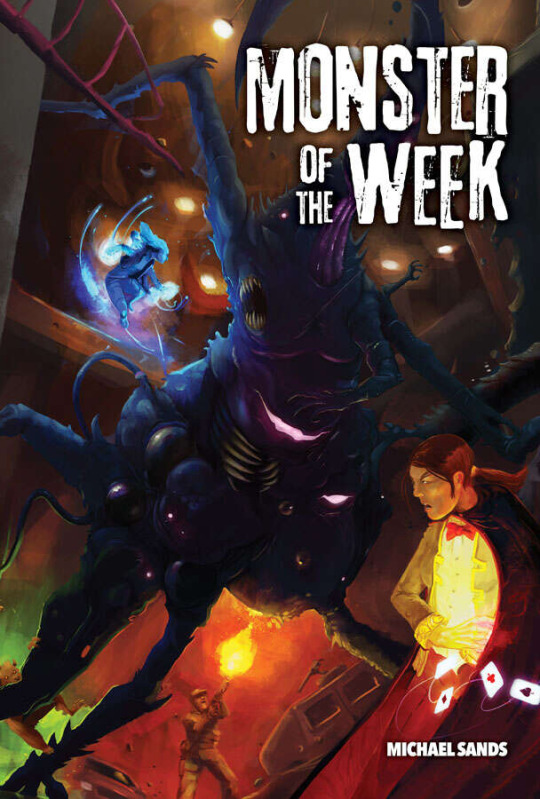
I only got to play this game for one session so I don't have that great of an insight into it, but it was still a fun experience. We played a pre-written module about hunting down someone making cyborg monkeys and I had a lot of fun. Pbta does a good job simulating tropes and everybody at the table leaned into it. I had a lot of fun playing a stock secret agent who does a poor job of being secretive. I'm not 100% sure I got the full danger experience out of the system. We played the one shot with 7 luck boxes, so we were pretty much able to just ignore harm any time we were in danger. It felt kind of awkward and the GM reduced how many we could use half way through the session. We also managed to track down the creator faster than the GM apparently expected. Someone with more experience on the system would probably be able to explain what might have went wrong, so I'm not going to be to harsh on the game for this. If I ever got the chance to play or run this game, I would absolutely take the opportunity to do so.
8 notes
·
View notes
Note
2. How and when did you get into VtM?
16. Do you have a character that was created from a dumb/ silly idea but now you can't imagine not having them?
17. You suddenly switch places with one of your characters, which one would you prefer to be?
2. i was 12 and part of my dad's ttrpg group (i had joined 3 years prior for pathfinder, bc this squad of 40 y/o white suburban dads were the only ppl i knew who were playing it) and after our savage worlds game wrapped up we decided vampire the masquerade was next and my baby bat autism immediately latched on to it. i was already halfway through reading the vampire lestat when it got announced it would be next so it really was the perfect storm. i went on to abuse being the kid of the group and the fact that the guy STing was incredibly bullyable to pull some crazy shit off with cass lmao. it wasn't the most amazing game but i am forever glad that this group didn't like, water down the setting or themes for me just bc i was a kid bc if they had i probably would have never gone back to it after that chronicle.
16. i mean the most outwardly dumb/silly character i have is minerva, but that's a deliberate act on his part. other than stuff like that, i dont really make unserious characters- this isn't dnd, it's a dark dramatic horror setting and while people in that setting can be as funny and outlandish as they are in real life, it doesn't really fit the assignment if the *character* as a narrative tool is also a joke. and honestly, even in dnd i don't really commit entire characters to a bit. like i love when people do make joke characters that then grow beyond what they started as into something that can take itself seriously, but i've never done it myself.
17. oh god. am i allowed to say none of them? if im gaining their actual personal knowledge and not just their circumstances and abilities, then probably aster? but like, even then i've got the hecata breathing down my neck to be a good reprisentative to the qnarch administration and also appease a godlike wraith, as well has having a couple very very very pissed off salubri trying to kill me. so like, still a pretty raw deal. kellen gets close second for having my dream job and being tzimisce but the bond junkie blood leech bound to a methuselah part is. kind of a deal breaker for me.
1 note
·
View note
Text

Tavern Keeper Vixie Belle sits down with one of the resident Barkeeps at the Pocket Dragon, Anthony Grybinas. Anthony edits all of the PDP shows in conjuction with Vixie Belle, who does the final color, effects, and polish passes. Anthony is an integral part of the team, carefully selecting and cutting together the show in a way that tells the story the table is trying to tell in a way that makes sense for the audience.
Tavern Keeper: What has your experience been like working on an actual play ttrpg show?
Anthony: Working on an actual play TTRPG has been a lot of fun and an eye opening experience for sure, given that it's something I've always wanted to dip my toes into as a player but never found the chance to. To me, it's a whole like watching an improv show with a Television-quality story - and that's awesome.
TK: What would you say are some key differences between an actual play and tv shows or web series?
Anthony: For one, you've got to use your imagination, whether you are a player, audience member, or the guy behind the keyboard watching it all in post. On television, what you see is what you get, yet in a TTRPG, what you see can shift at any moment, as we're all playing a part in the story.
TK: Tell us about your experience before becoming an editor at the Pocket Dragon Pub.
Anthony: Before becoming an editor at the Pocket Dragon Pub, I spent my time bouncing between AD work on-set or freelance editing work, and another period on-stage in the music industry. Doing all that has given me a 360-degree view of creating content, media, and what makes for an entertaining show, which has proven to be an invaluable gift of experience.
TK: What would you say is your greatest challenge when editing?
Anthony: The greatest challenge when editing is not to figure out what to cut, but what NOT to cut. Interactions that go off the rails sometimes must be cut for time and brevity's sake, but on special occasions, the energy and laughter shared is so electric that it must be left in. It reminds me of the best times riffing with friends, which is why many come to see a live show in the first place.
TK: Do you have a favorite moment from any of the shows you've edited so far?
Anthony: Any moment that somebody decides to do a "voice" for their character and stick to it for the entirety of the run gets a vote of "love it" from me.
TK: What episode would you recommend to someone who wants to start watching episodes of the Pocket Dragon Pub?
Anthony: I feel like the Northern Lights One-Shot has the best balance of personal interplay, plot, and improvised fun that could give a new viewer the right impression for what TTRPGs at Pocket Dragon Pub is all about.
TK: Is there anything else that you'd like to add?
Anthony: Thank you for the great times!
The Pocket Dragon is only as good as the incredible people behind the bar - we hope that you'll get to know each and every one of them and appreciate them as much as we do!
🍻Cheers!🍻
0 notes
Text
So this gets at a lot, but the core thing that I feel like it doesn't take into account is that D&D was based on war gaming. There's been a lot of attempts to make it more friendly to the people from Group B over the last several decades, but it was always made for Group A.
The other part of the conversation that I think the above kinda misses is that D&D is such an overwhelming force in the TTRPG space that it's almost a sort of mental kudzu. Its overwhelming presence in the space makes it extremely difficult for literally any other game to get a foothold.
And so you have this game that actually isn't made for Group B on the one hand, and you also have a megacorp that has historically, repeatedly, and very recently mowed over its players and independent creators. WotC is not only actively bad for the biodiversity of TTRPGs but they're also apparently so terrible to work for that I've heard working for/on D&D called "the revolving door outside Seattle" in conversations with other TTRPG writers.
When you attempt to make D&D, specifically, work better for Group B, that takes an awful lot of work. It would be much easier for Group B to pick up a game that is made for that style of play, just the same as it is much easier for three adult people to ride one of those boardwalk pedal cars than to all pile onto a BMX bike sized for a 9 year old. Could you maybe make it down the boardwalk, all 4 of you, on Timmy's BMX? Well, maybe? But wouldn't it be more enjoyable to use a vehicle actually suited for your purpose and designed to be comfortable and fun for everyone at the table?
So while it's true that you've got these two groups who look at the game differently and thus there is a clash of understanding on that level, it's also true, and very important to understand, that a lot of other things go into people begging others to play anything - anything - other than D&D:
TTRPG biodiversity is supported by people playing (and buying!) other games, leading to a sustainable industry which can support lots of game options
WotC having such a large market share is actively bad for gaming (this is not the same thing as #1) and anything that spreads out gaming dollars is good
Jesus please just buy games actually developed by diverse authors and not also owned by fucking Hasbro instead of trying to make another mod of a war game created by TTRPG's original Sex Pest DM
please, we're so tired, please, just try the boardwalk pedal car, Timmy's BMX is rusty
Like, yes, that's true, you could possibly turn that screwdriver into a paintbrush, but the sixteenth time you ask your painter friends how to turn a screwdriver into a paintbrush after the last fifteen times you've asked them and later complained about how hard it was to get your landscape to come out looking good when you wouldn't just BUY A FUCKING PAINTBRUSH LIKE I TOLD YOU TO, MAN, they're probably going to start getting annoyed.
For disclosure's sake, I have a vested interest in people trying other games because I write for RPGs that aren't D&D, and the company I own works with @theonyxpath on merchandising for their games. (In fact, there are 4 days left on crowdfunding for a very awesome JRPG game that @impernious developed & for which my company is fulfilling the enamel pins that we developed with OPP.) So. 🤷🏻
(Also, today was an extremely long day, and I ended it slightly sunburnt and dehydrated, so maybe I'm missing something here or wildly missing the point, but I do think those pieces are important to understanding why people get so confused and frustrated in these conversations.)
Seeing @thydungeongal constantly wrestling with people interpreting her posts about D&D in ways that seem completely alien to me has convinced me that there are actually multiple completely distinct activities both being referred to as "playing D&D" Before we begin, I want to stress that I'm not saying one of these groups is Playing The Game Wrong or anything, but there seems to be a lot of confusion and conflict caused by people not being aware of the distinction. In fact, either one works just fine if everyone's on the same page. So far, I think I've identified at least two main groups. And nobody seems to realize the distinction between these groups even exists. The first group of people think of "Playing D&D" as, well, more or less like any other board game. Players read the whole rulebook all the way through, all the players follow the instructions, and the gameplay experience is determined by what the rules tell each player to do. This group thinks of the mechanics as, not exactly the *whole* game, but certainly the fundamental skeleton that everything else is built on top of. People in the second group think of "Playing D&D" as referring to, hanging out with their friends, collaboratively telling a story inspired by some of the elements in the rulebooks, maybe rolling some dice to see what happens when they can't decide. This group thinks of the mechanics of the game as, like... a spice to sprinkle on top of the story to mix things up. (if you belong to this second group, and think I'm explaining it poorly, please let me know, because I'm kind of piecing things together from other people saying things I don't understand and trying to reverse engineer how they seem to be approaching things.) I think this confusion is exacerbated by the fact that Wizards of the Coast markets D&D as if these are the same thing. They emphatically are not. the specific rules laid out of the D&D rulebooks actually direct players to tell a very specific kind of story. You can tell other stories if you ignore those rules (which still counts as "playing D&D" under the second definition, but doesn't under the first)And I think people in both groups are getting mad because they assume that everyone is also using their definition. For example, there's a common argument that I've seen play out many times that goes something like this:
A: "How do I mod D&D to do [insert theme here]?" B: "D&D is really not built for that, you should play [other TTRPG] that's designed for it instead" A: "But I don't want to learn a whole new game system!" B: "It will be easier to just learn a whole new system than mod D&D to do that." A: "whatever, I'll just mod D&D on my own" And I think where this argument comes from is the two groups described above completely talking past each other. No one understands what the other person is trying to say. From A's perspective, as a person in the second group, it sounds like A: "Anyone have some fun inspirations for telling stories about [insert theme here]?" B: "You can't sit around a table with your friends and tell a story about that theme! That's illegal." A: "But we want to tell a story about this theme!" B: "It's literally impossible to do that and you're a dumb idiot baby for even thinking about it." A: "whatever, jerk, I'll figure it out on my own."
--- Whereas, from B's perspective, the conversation sounds like A: "How do I change the rules of poker to be chess, and not be poker?" B: "uhhh, just play chess?" A: "But I already know how to player poker! I want to play poker, but also have it be chess!" B: "what the hell are you talking about? What does that even mean. They're completely different games." A: "I'm going to frankenstein these rules together into some kind of unplayably complex monster and you can't stop me!" ---
So both people end up coming away from the conversation thinking the other person is an idiot. And really, depending on how you concieve of what it means to "play D&D" what is being asked changes considerably. If you're only planning to look through the books for cool story inspiration, maybe borrow a cool little self contained sub-system here or there, then yeah, it's very possible to steal inspiration for your collaborative story from basically anywhere. Maybe some genres are kind of an awkward fit together, but you can make anything work with a little creativity.
If, however, you are thinking of the question in terms of frankensteining two entire board games together, then it becomes a massively difficult or even outright nonsensical idea. For example, for skill checks, the game Shadowrun has players roll a pool of several d6 at once, then count up how many rolled above a target value to see how well a character succeeded at a task. The whole game is full of specific rules about adding or removing dice from the pool, effects happening if you roll doubles, rerolling only some of the dice, and all sorts of other things that simply do not translate to rolling a single d20 for skill checks. On a basic level, the rules of the games work very differently. Trying to make them compatible would be much harder than just learning a new game from scratch. Now, neither of these approaches is exactly *wrong*, I guess, but personally, I find the rules of TTRPGs to be fascinating and worth taking the time to engage with all the weird little nuances and seeing what shakes out. Also, the first group, "TTRPG as fancy board game" is definitely the older and more widespread one. I kind of get the impression that the second group largely got into D&D through actual play podcasts, but I don't have any actual data to back that up. So, if you're in the second group, who thinks of D&D as basically a context for collaborative storytelling first and a game second, please let me know if I'm wildly misunderstanding how you approach D&D. Because I'm pretty sure it would save us a whole lot of stupid misunderstandings.
2K notes
·
View notes
Text
other than adding a line here or there to my "cool lines/vents i might use in future songs" file i haven't created anything since i went on these meds and i will not lie. i am a little worried
#i also just don't really feel the need to which is even more distressing#but. it does save me the frustration of my neverending writer's block lol#hm i told my psychiatrist this is smth I'm worried abt which is why she didn't give me mood stabilizers#but if the ssri is the issue then :///// oof#it also makes me want to listen to music less which is just plain weird tbh#again it saves me the anxiety of needing to have music on constantly but it's also distressing#when i DO try to get down to create like with my ttrpg I've got literally nothing. and i got no new ideas for anything either#not to be dramatic but i don't deserve to live if i can't. make anything. so what's the point.#ooooooh I'm spiraling now 😎 oh yeah we're in familiar territory now. see the pills didn't change me much. lmao#these pills are meant to be a crutch but i think they just make me feel worse. except ig i feel bad out of bed instead of in bed#:/ I'll tell her next time we meet ig#vent#sorry
1 note
·
View note
Note
I love the entire concept of Cookie... the look, the fashion, the gender... Would you mind telling us a little more about him? I'm also intrigued about why she's named Cooking with Gorgeous!
HI i would LOVE to talk about george thank you so much. also this makes me realize i've never actually sat down and just made a post unabashedly infodumping at length abt an oc before and it seems silly that i haven't. i ask only for all dear readers to please temper their expectations for this post with the knowledge that i just smoked half a joint before sitting down to answer it. a small one. but still. anyway
FIRST OF ALL FOR THE UNACQUAINTED THIS IS COOKING WITH GORGEOUS, aka cookie or george for short. he uses he/him and she/her pronouns interchangeably!
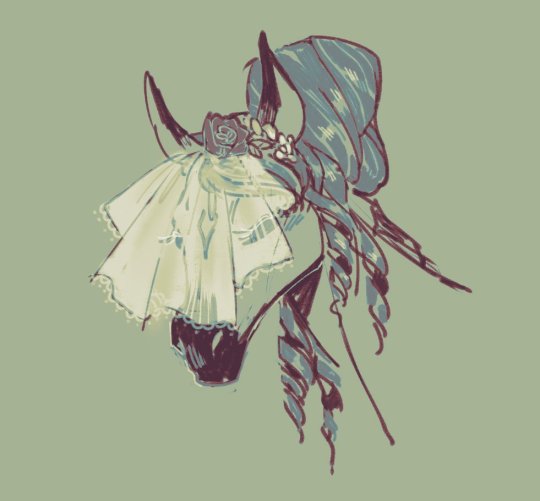
hi sorry that's not cookie that's a horse in a bridal veil that i. found in my stuff while trying to scroll and find my cookie art. i just got distracted and had to show you. okay no for real here's cookie
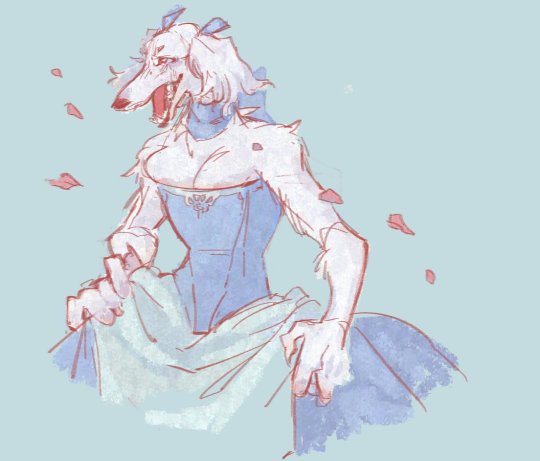
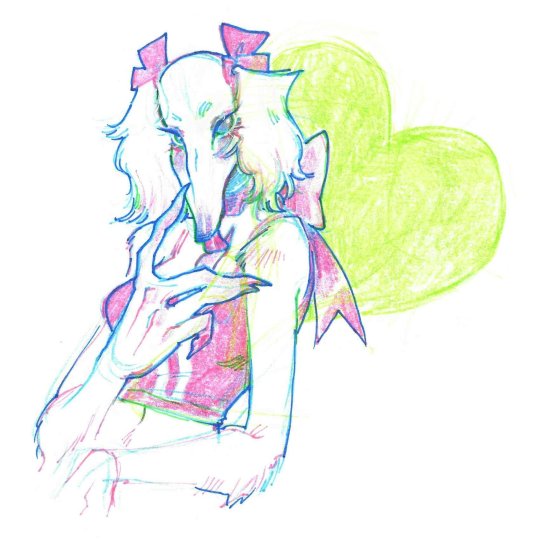
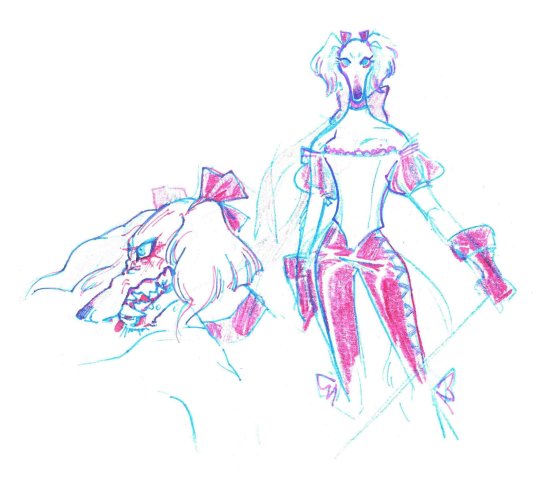
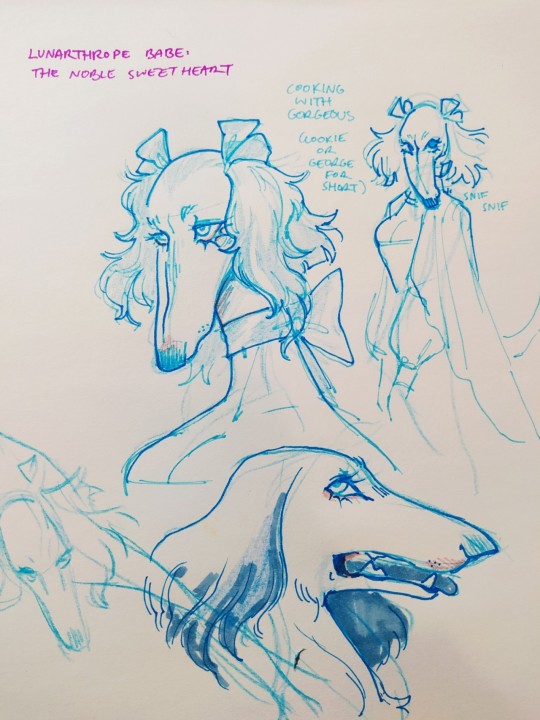
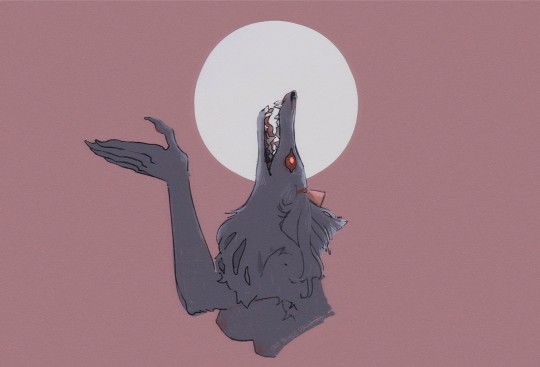
he's the character i'm playing in a playtest campaign of the absolutely mesmerizing sapphicworld, an in-development ttrpg!!! and if i'm going to be talking about cookie i feel like i HAVE to say i think a huge amount of her charm and dazzle and charisma comes directly from the charm and dazzle and charisma of the setting i created her for. i know i am laying it on really thick right now but that is on purpose. i want, desperately and unashamedly, for this game to get really popular bc 1. it's genuinely that good. and it's not even DONE yet and 2. i want everyone to get into it so that everyone will make sapphicworld characters and then i'll get to see everyone's sapphicworld characters.
EDIT i'm scrolling back up here and adding a readmore bc this is already getting so long lol. you asked for "a little more" and apparently i have graciously decided this means "literally every fact about cookie that exists in my brain"
SO a lot of the info/tidbits i haven't shared about cookie are i guess gameplay-specific stuff... his title (which is like a class/playbook) is "The Noble Sweetheart," though in sapphicworld "nobility" no longer has anything to do with wealth or class, and is instead entirely about amassing a court purely via devotion/popularity; her subculture (which is like, Who You Hang Out With; drifters, goths, poets, debauchers, cowpokes, etc) is Babe; and her kind (which is like ancestries but in sapphicworld is really just like, a physical form, which u can change more or less at will) is Lunarthrope, which is basically a werewolf!! or more broadly a furry, since u always look like whatever were-animal you are 24/7. just MORE at night, tho i suppose i don't represent that aspect much in my cookie art... ANYWAY i am restraining myself from just sitting here and like. transcribing her entire character sheet. but basically what all this means is that cookie's role in the world (at least at the beginning of the campaign) is "Professionally — no, VOCATIONALLY Hot Person who everyone loves so so so so so so much." cookie really enjoys this role.
he's named cooking with gorgeous because he's an avid cook, and he wants to share that with you, and he's gorgeous!! though honestly the cooking hasn't ended up as important to his character as it was when i first came up with him, lol — but my initial concept was kind of like, what's the equivalent of a bouncy normie recipe blogger/lifestyle influencer but in the context of the lush horny trans deathless psychedelic universe of sapphicworld. and it's cooking with gorgeous, a doggirl dyke with big blue boobs (six of them!!) who is so devastatingly cute and darling that a bunch of people just kind of pledge their fealty to him for no real reason other than he feeds them. and is cute
also her name is def influenced by the fantastic names of many canon sapphicworld npcs! like, quick example list of some npc names off the top of my head: the booty commie, death cybernetic, princess eureka!, the culinary goof (whom cookie dislikes. btw.), pizza friday (whom cookie loves!!!)
cookie is very very determined, and she's ALMOST always very confident. even when she isn't feeling confident, she's still very good at forcing herself to keep putting one foot in front of the other — maybe just while screaming or crying or uncontrollably barking or at least very ardently complaining. he has a tendency to be spoiled and, like, tactless-via-obliviousness, so sometimes he can be grating to interact with, and he has a petty/vindictive streak; but in general he's an AGGRESSIVELY kind person and usually aims all his shrill, cheerful stubbornness directly toward the goal of refusing to accept anything but the best for everyone.
at the beginning of our campaign cookie has JUST received a brand new castle!!!! (chateau gorgeous.) which he doesn't actually "own" bc, remember, no wealth or class in sapphicworld, but he's the ENTHUSIASTIC new caretaker and is chomping at the bit to renovate it so ppl can live there and he can throw a bunch of magnificent parties and basically continue living exactly as he has been, But Even More Fabulous. obviously this is exactly when the main plot threat of the campaign shows up and spoils everything and compels cookie to go on his First Ever Adventure!!!!!! she HAS to save the world otherwise NOBODY will be able to go to the first big party at chateau gorgeous :((((
at this point to prevent myself from just like, giving you guys a play by play of the entire campaign so far i am going to just start listing every cookie fact i can think of as bullet points
🎀 he owns a magical sword in the shape of a giant microplane. it's called The Microplane. he pronounces this "mee-crow-plah-nay"
🎀 george desperately wants to resurrect The Dog-Lich, an entity that once ruled over all beasts from its palace on the moon but was murdered and torn to pieces in a cosmic war far in the past. her attitude towards this desire is 50% devoted lunar cultist, 50% parasocially obsessive twitter stan
🎀 this isn't really a cookie fact but going back to how his title is The Noble Sweetheart — just for a glimpse at party composition, his fellow party members' titles are The Intimate Scholar, The Tentacle Advocate, and The Tw*nk Controversial (the * is the canon spelling).
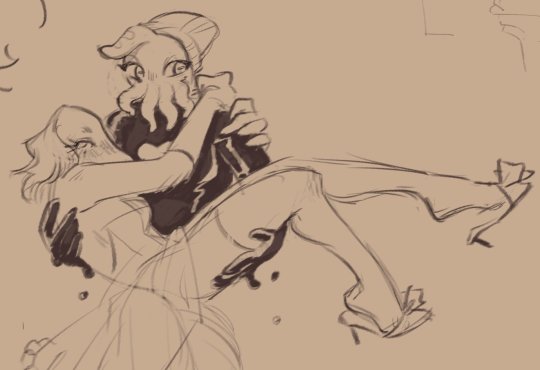
^ aforementioned tw*nk. its name is Mwah ("pronounced like the kiss you blow at someone you just fucked over"). mwah is played by @/squiddelyfather on twitter!
🎀 mwah and cookie used to be very, very tight, BEFORE mwah became the tw*nk controversial. now that it's so.... you know.... controversial, well. they're still very close, but it has gotten a little stilted and weird (and watching them slowly un-weird it together as the campaign goes on has been one of my fav roleplay experiences ever honestly)
🎀 cookie's other adventuremates, skarligge and delaryn, are both very indulgent towards him. delaryn acts the most grumpy/dismissive about it but is honestly sometimes the worst about spoiling cookie out of anyone in the party (skarligge's player is twt@/clown_dream and delaryn's is twt@/glaiveguisarme and hey while im at it our fantastic gm is the sapphicworld dev, twt@/ddemoneclipse. hi guys i hope u don't mind me chattering abt ur ocs here lol it's just hard to talk abt the best of cookie w/o bringing up everyone else's characters and roleplay also!!!)
🎀 cookie is very VERY sensitive and will burst into tears at the drop of a hat. the precursor to this is her eyes getting So So So Big And Wet And Round. one of my favorite bits to menace the other party members with is when something is not going cookie's way i will lean into my mic and say "cookie's eyes are getting so so so big. they're getting so big and wet and round and shiny. they're so so round and fucking big her eyes are like big wet black glass marbles" and this is like kryptonite to them. this is like getting hit with deadly radiation
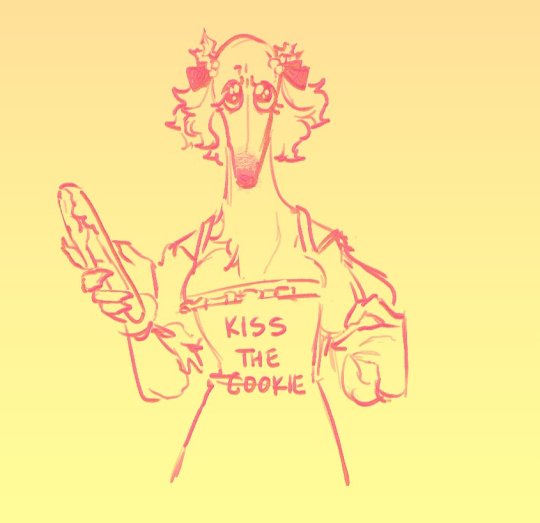
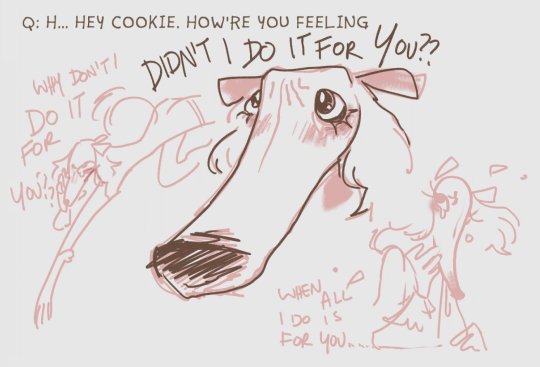
🎀 oh speaking of fashion!!!! one of cookie's perks from being a Babe is that she can always change her look whenever she wants. she will ALWAYS have whatever outfit she needs and can quickchange instantly. wait this reminds me i have a bunch of seasonal holiday outfits sketched out and i don't think i've ever posted them here but it'll only let me put one more image in this post. well here have this one
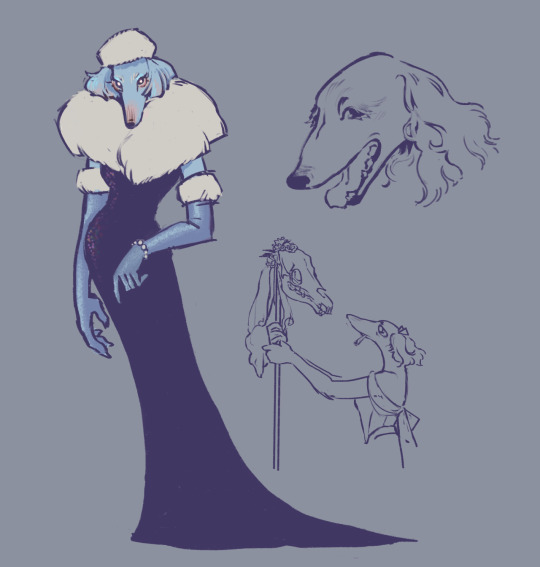
🎀 okay well suddenly i have forgotten all other george facts so that's all for now!!! from now on i will try to just dump oc facts like this more often tho this is really fun. ty for getting me going lol!!!
439 notes
·
View notes
Text
Play Thirsty Sword Lesbians

So on bird app I talked about how many community copies of Thirsty Sword Lesbians there was and now 100s of people have claimed community copies of the game [Note Community Copies are free copies of PDFs which are on many itch.io TTRPGs and even community made TSL playbooks]. Since a ton more people now have access to my favorite game and one I've worked on for every edition so far as well as making a fan playbook, I wanted to talk about what is special about the system, what makes me love it so much, and why you might want to give it a try.
Thirsty Sword Lesbians is a simple game to understand but it refines even the most simple parts of it's design to make a better experience. In Thirsty Sword Lesbian's there is no failure or success. You roll d26 plus your modifier then you are either given a down beat, a mixed beat, or an upbeat. None of these mean you did what you intended. You can have a down beat where you knocked out the guard you had been trying to knock out but it turns out she was your girlfriends sister and without the context she just witnessed you assaulting her family. You may get an upbeat trying to do something and trip and fall and end up landing perfectly knocking away the sacred stone that the villain needs to turn the world into skeletons, with witnesses now thinking your amazing where in truth you have never quite been good at this.
Playbooks are designed with great intentionality to them each is designed with an emotional conflict at the heart. Where classes and playbooks can often be more like picking your powerset, in TSL your picking a struggle. It's not that other things might not be also bothering you but the conflict is something internally you are dealing with that's standing above the rest of the other conflicts you might have. This is an element that just feels very queer, we all have our problems, our traumas, and we work through them together. Each playbook also has a core mechanic that makes it stand out from the others, these have a narrative weight and a textual weight. These core mechanics typically take the form as some advantageous ability but are also deeply rooted in your conflict. They encourage you as a player to roleplay just by using the most basic aspect of your character.
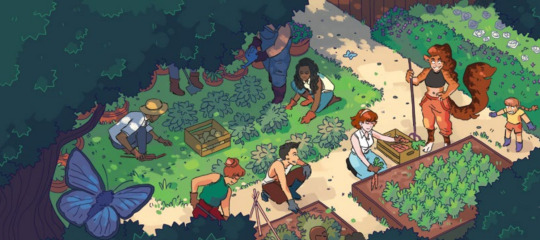
I have to be real though, the thing that first made me fall head over heels with Thirsty Sword Lesbians was how funny and cool the adventures were. When I was reading the playtest version of the game, before I was brought on to write Yuisa Revolution and later The Matriarch, I was just playing a one shot and thought the name sounded fun. I read Best Day Of Their Life and just knew, this game was gonna be utterly my shit. At first I was just skimming like I do with most TTRPGs at first glance, but I read the first couple lines of the setting and I decided "fuck, I have to read all of this." I read the whole thing, made a character for my one shot and right after that session signed up to run multiple one shots of the game so others could get to play it because I loved it so much.
I don't normally like to play in premade settings but each of these are simple enough to really build on with enough going on that made it easier to run if you didn't want to get super creative and make a bunch of new shit. It really made me fall in love with setting writing in a way I just didn't before. I had gotten asked to work on Mutants and Master Minds before I TSL but I thought it was so boring working on the setting I quit and left money on the table. However, when April approached me to write a setting, I said yes, right away, no hesitation and now I work in TTRPG design. I had done TTRPG design work before but I wasn't locked in after quitting comics, it was how exciting the settings were that got me so inspired to create.
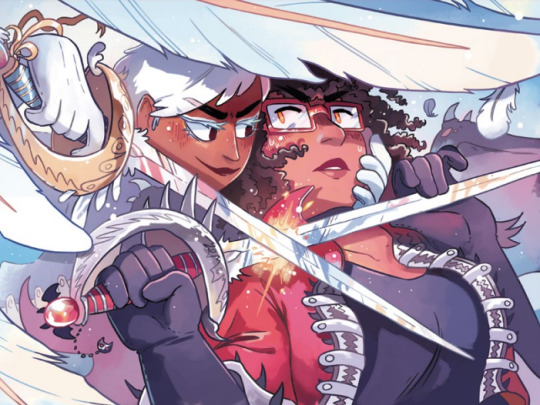
While many refer to Thirsty Sword Lesbians as a Powered By The Apocalypse game and by all means it is in a lot of senses, I think Powered By Lesbians is a very distinct flavor. It cuts out everything bad about PBTA and adds so much to the table. Chiefly among them is the smitten mechanic which is a mechanic I wish like every game had. It is one of the most clever pieces of game design ever convinced of. Being smitten has you do a moment of dramatic introspection, while I am one for more bright and cheery and less drama focused stuff, it's amazingly juicy hooks for a GM to get into. It not only allows you to put out your characters personal doubts about a potential relationship but it also says to the GM and everyone playing "I like this character, I want to see more of them, I want to explore where this goes." It's also in addition a way for players to tell each other "I want to be romantic with your character" and if they chose to get smitten back it's mechanically saying without even needing an out of game chat "Let's roleplay some romance."
Thirsty Sword Lesbians is really something special, I could gush on and on but already a lot given I worked on it and am currently working on it but I just wanted to talk about why the system is special to me. I hope I got you interested and I don't make any royalties on TSL sales [yet] so like I am not really biased here outside of the pages I worked on and that I made friends with a lot of folks who worked on it over my time working on it and after. Go clash swords and cross hearts.
#TSL#thirsty sword lesbians#TTRPG#Indie TTRPG#Gay Games#Lesbian Games#Sapphic Games#Queer Games#lesbian#trans#lgbt#lgbt+#gayming
169 notes
·
View notes